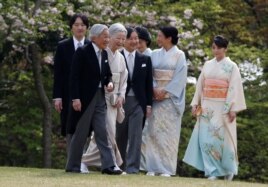01 April, 2019
Japanese officials have chosen a name for the period of rule of Japan's incoming emperor.
Chief Cabinet Secretary Yoshihide Suga announced the name on Monday in Tokyo.
Crown Prince Naruhito will become emperor on May 1, one day after Japanese Emperor Akihito leaves the position. This will be only the second time in nearly 100 years that Japan has welcomed a new era.

Japan's Emperor Akihito, flanked by Empress Michiko, leads his royal family members Crown Prince Naruhito (C), Crown Princess Masako (2nd R), Prince Akishino (L), Princess Kiko (3rd R) and their daughter Princess Mako to greet guests.
Although use of the era is not required by Japanese law, it is widely used on government and business papers, calendars and other documents.
The current era, known as "Heisei" under Emperor Akihito, has lasted 30 years. The term is often defined as meaning "peace prevails everywhere." During that period, Japan has not been involved in a war, but has experienced natural disasters and economic troubles.
The new era is to be called "Reiwa." It was chosen by a group appointed by the government from names suggested by scholars.
Rules require that the name have two Japanese characters, known as Kanji, which are easily read and written but are unusual or literary in nature. The first character can be defined to mean "order" and the second as "harmony" or "peace."
The term comes from a poem about plum blossoms in a collection of Japanese poems called "Manyoshu." It is said to have been written about 1,300 years ago.
After the announcement, Japanese Prime Minister Shinzo Abe spoke about the meaning of Reiwa. Abe described it as: "culture is born and nurtured as the people's hearts are beautifully drawn together." He expressed his wishes that the new era would be "filled with hope."
Over more than one thousand years, Japanese era names have come from Chinese classic literature. Abe said the "Manyoshu" was chosen because it was Japan's oldest collection of poetry written by royal family members and ordinary people.
Abe has expressed support for the image of the emperor, who enjoys wide public support.
Japan's current constitution was written after World War II. The constitution denounces war and gives the emperor no political power.
Emperor Akihito gained what is known as the Chrysanthemum Throne in 1989 after the death of Hirohito, Japan's emperor during World War II.
I'm Mario Ritter.
Steve Miller reported this story for VOA News. Mario Ritter Jr. adapted it for VOA Learning English, with additional materials from the Associated Press. George Grow was the editor
We want to hear from you. Write to us in the Comments section, and visit 51VOA.COM..
______________________________________________________________
Words in This Story
era – n. a period of time linked to a quality, event or person
prevail – v. to succeed, to defeat an opponent after a long struggle
character – n. a symbol, letter or number used in writing or printing
scholar – n. a learned person; someone who studies under a teacher
nurture – v. to help someone or something grow, develop and succeed
ordinary – adj. normal or average; common